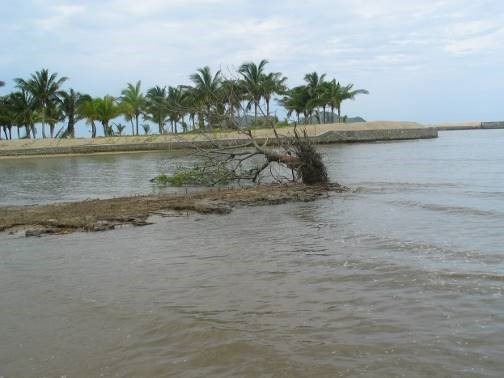First Report on mangrove conservation in china
The newly issued report thoroughly evaluates situations and conservation actions regarding mangroves in China.
Study shows that converting aquaculture ponds into mangroves is a promising measure for restoring mangroves in China.
Written by Wu Jinhong of the Shenzhen Mangrove Wetlands Conservation Foundation (MCF)
June 8th, 2020 was the 12th World Oceans Day. China designated the theme of this year’s festival as “Protect the mangroves, Protect the ocean.” Under the guidance of the Wetland Management Department of the National Forestry and Grassland Administration (NFGA), the Paulson Institute, Lao Niu Foundation, and Shenzhen Mangrove Wetlands Conservation Foundation (MCF) jointly issued the Report of China Mangrove Conservation and Restoration Strategy Research Project. This is China’s first research report to comprehensively assess the state of mangroves, reviewing the status and problems of the conservation, restoration, management, and utilization of mangroves. It also put forward practical suggestions to promote the formation and implementation of China’s national strategy for mangrove conservation.

© MCF
The conference was held in Shenzhen Futian Mangrove Ecological Park, which has been operated and managed by MCF since 2015 and was commissioned by the Futian government. The conference was live broadcasted online to over 200,000 people, including scholars of mangrove research and staff of related government departments, reserves, and NGOs.
The report points out that the structure and function of mangrove ecosystems in China are generally stable, but the degradation in some areas is significant. It also takes the latest situation and characteristics of mangrove protection and restoration, both domestically and globally, into consideration. According to the distribution and protection status of mangroves in China, the report analyzes the degree of mangrove degradation and its primary causes, and evaluates the inadequacies of current mangrove conservation and management, with a particular focus on the mangrove restoration model based on tidal flat afforestation and artificial restoration, as well as the problems with domestic mangrove afforestation standards.
The main battlefield of mangrove restoration in China should be "converting ponds to forests" and relevant research should be conducted.
Professor Wang Wenqing, the leader of the project team and the deputy dean of the School of Environment and Ecology at Xiamen University, presented the main conclusions and recommendations of this report at the conference. He emphasized that the main purpose of mangrove restoration should be restoring the structural integrity of the entire mangrove ecosystem and its service functions, rather than simply seeking to increase mangrove area.

Mangrove lodging is resulting from changes in hydrodynamic conditions. / © Wang Wenqing
China’s mangrove wetlands are regulated by several government departments with the Wetlands Management Department of NFGA being responsible for the overall plan for the protection and restoration of mangroves. Since 2000, the Chinese government has attached great importance to mangrove conservation and has implemented several national projects for the protection and restoration of mangrove wetlands. Bao Daming, Deputy Director of the Wetlands Management Department, participated in the conference and said:
“China has made certain achievements in protection and restoration of mangroves, and has become one of the few countries in the world where the area of mangrove wetlands is growing.”
At present, there are 52 natural protection areas of mangroves in China, covering over 55% of the mangroves all over the country. It is a particularly important part of the coastal wetland conservation. However, there are some difficulties in mangrove protection and restoration, such as prominent contradiction between protection and development, insufficient capital investment, and difficulty in afforestation, which affects the process of mangrove protection to some extent. It is expected that the research and publication of this report will provide advice and scientific support for the national mangrove restoration program and guide our mangrove conservation work in the future.
The full report is available here in English and on our resources tab